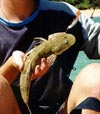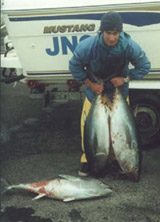So what's wrong with fish?
by David Ogilvie
Recreational fishing
Recent estimates have put the number of recreational fishers in Australia as high as 5,000,000, with 800,000 here in Victoria. This high level of activity has a significant economic impact on coastal communities, but there is a growing realisation among fisheries managers that it is also having a major impact on the marine environment.
This is contrary to the perceptions of many recreational fishers who believe that they have only a minor impact (both individually and collectively) on fish stocks and that commercial harvests are the primary cause of actual or perceived fish declines. Neither perception is supported by available studies.
VNPA research review
|
 |
In a review of available research, carried out for the Victorian National Parks Association (VNPA) by Dr Mark Norman, a Victorian marine biologist, it has been revealed that recreational fishing removes large amounts of fish from our marine environment, and that recreational fishing pressure is building.
The Norman review confirmed that recreational fisher impact on fish stocks is substantial. In Port Phillip Bay alone, boat-based recreational fishers (excluding shore-based anglers) spend 2.7 million hours each year fishing, catching an estimated 2.7 million fish. Estimates of annual day boat catch by recreational fishers in Port Phillip Bay are 469 tonnes, close to the commercial catch of 482 tonnes (excluding pilchard/sprat harvests). (2)
During a four-month survey in Port Phillip Bay during 1995, commercial harvests were estimated to catch a greater weight of snapper than in the recreational catch (28 tonnes versus 17 tonnes in a four-month survey). However, the smaller size of fish caught by recreational fishers meant that the recreational catch caught more than three times more fish (22,000 versus 7,000 in a four month survey). (3)
 |
A similar scale of recreational fishing occurs in bays in many other Australian states. And for a number of nearshore coastal species the recreational catch is often comparable to, or larger than, commercial catches. In a recent study of the impacts of recreational fishing in Queensland carried out by the Department of Primary Industries Southern Fisheries Centre, it was found that the recreational catches of tailor, yellowfin bream, whiting and dusky flathead were as high or even higher than commercial fisher catches.
Most of the authors of the studies reviewed by Dr Norman recognised that their estimates of numbers of recreational fisher numbers, fishing hours and catches were likely to be significant underestimates as each survey failed to include all components of the recreational catch including activities such as night fishing, shore fishing, charter fishing and catch landed at sites outside survey areas.
|
The review also found that recreational fishing pressures are growing through increased participation, more efficient gear, increasing access to areas by four-wheel drive vehicles and boats, and higher efficiency in finding fish using technologies such as echo-sounders and geographical positioning systems.
Recreational fishing has a number of other actual or potential impacts that add to the pressure of coastal use. These include mortality of released animals, retention of undersized fish, lost gear, habitat damage, hydrocarbon release by outboard motors and the ecological impacts of fish removals.
CSIRO Port Phillip Bay Study 1999
Research associated with the CSIRO Port Phillip Bay Study (4) has highlighted the impacts of fishing on marine community structure. After comparing trawling surveys in Port Phillip Bay carried out in 1972-75 and 1990-91, accounting for differences in the survey equipment and techniques, and acknowledging the $2 million commercial catch value and the 2.7 million daytime, boat-based angler hours spent on recreational fishing, Hobday et al. concluded that:
Increased fishing pressure is the most likely explanation for declines in several important commercial and recreational species. A consequent decrease in competition may have caused an increase in abundance of stingarees.
The researchers added:
The most conspicuous change in the 10 most abundant species was the decline of those that are often taken by commercial or recreational fishers (sand flathead, tiger flathead and, except in the shallow region, yank flathead) and an increase in species (eastern shovelnose stingaree and sparsely spotted stingaree) that are rarely caught.
Professor Leon Zann, author of the State of the Marine Environment Report, is also concerned about the impacts of recreational fishing:
...the lack of public understanding of the principles of fisheries conservation and management has meant that even today, many do not accept that there is any great urgency for action to conserve fish resources. Most individual fishers do not accept that their own activities require control, and even less that they impact on other fisheries. (5)
|

